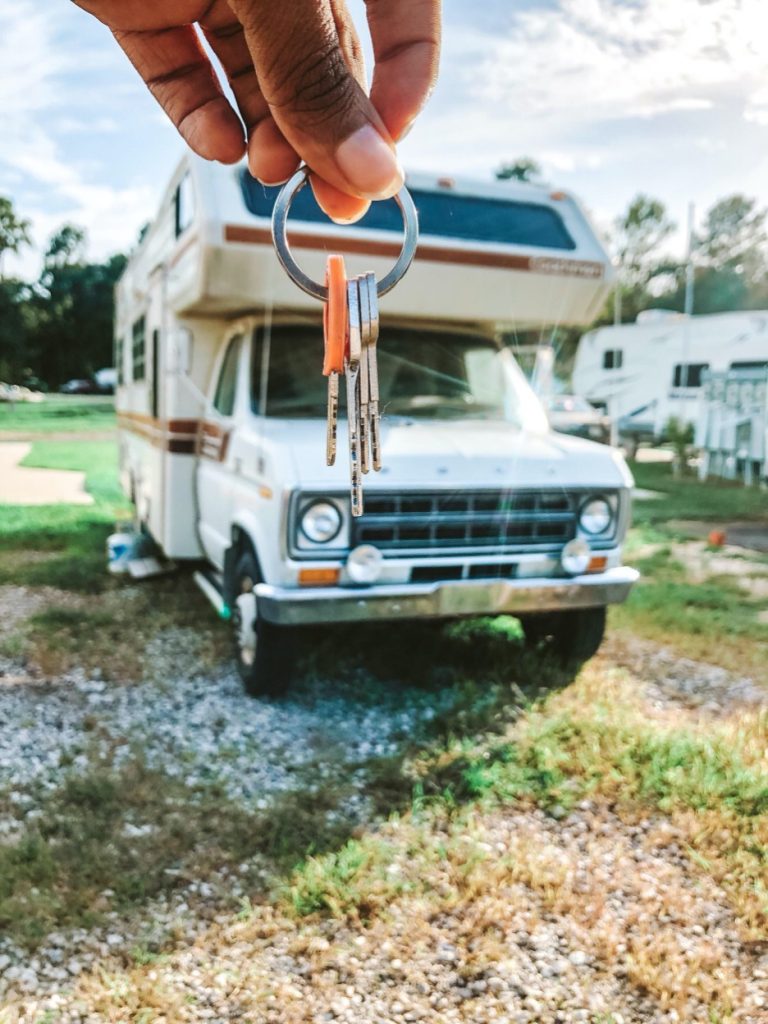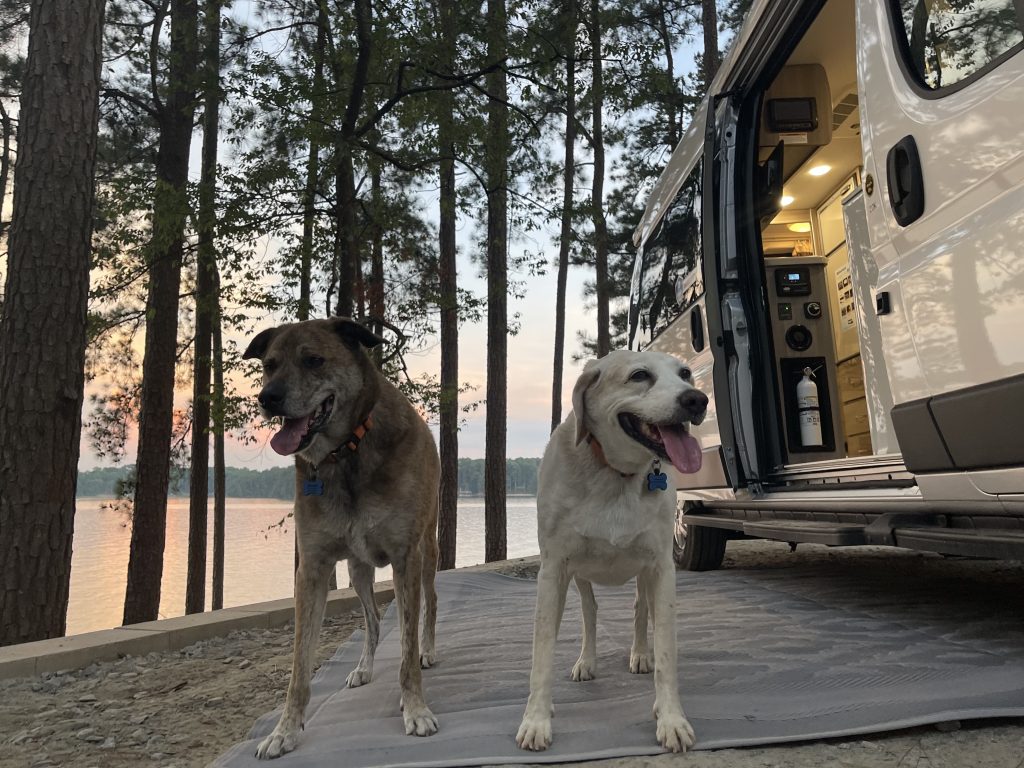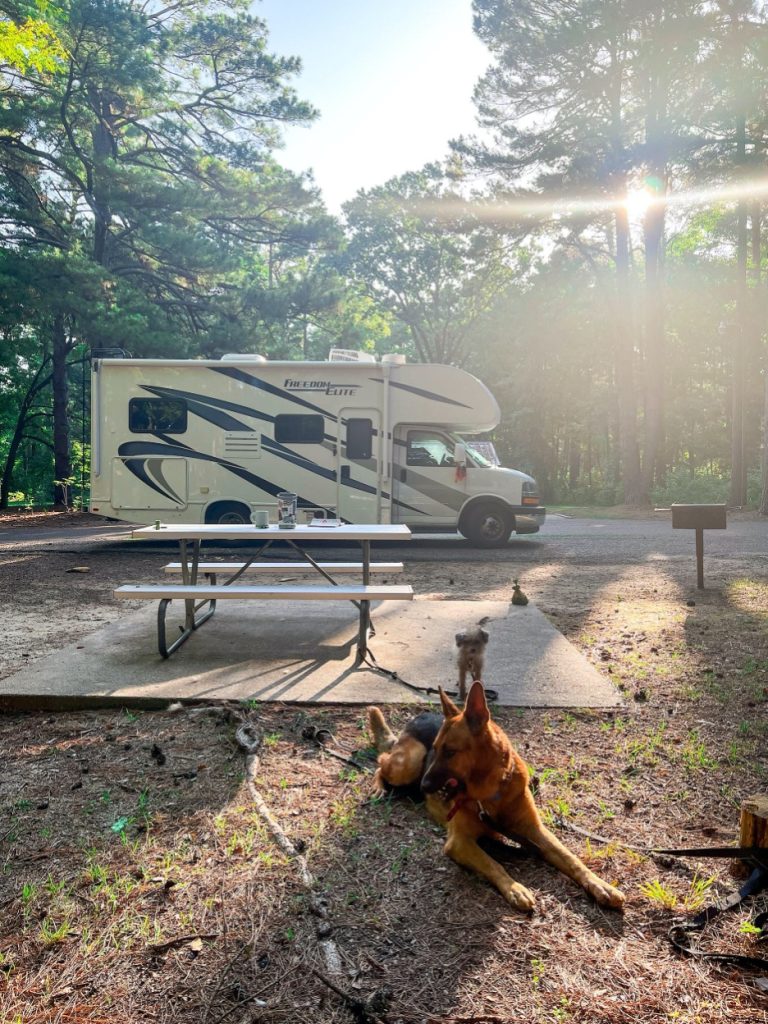When I first set out on the road full time, I had big ambitions. I was going to visit all the national parks and all 50 states. Twelve months after I started my new life I was obviously going to arrive in Alaska with perfect conditions to embark upon the famed Alaska – Patagonia trip that is a full-time nomad’s rite of passage.
Unfortunately, my dreams were a lot bigger than my gas tank, and my previous rig didn’t take me on half of the adventures I’d hoped it would. It did, however, teach me a lot about the speed and ways that I prefer to tackle traveling. While I’m still no expert, I find that it has provided me a basis from which to advise friends, family, and folks on the internet when they ask the question “how fast should I realistically be trying to travel?”
Finding Your RV Travel Type

I like to think most travelers fall into one of three categories:
The Wanderers
First, we have “Wanderers”. They’re slow-moving and thorough in the experience of a place, state, or region. When I’m not on a timeline for a shoot or project, I find that my travel style naturally falls into this category.
Wanderers enjoy spending anywhere from several days to multiple weeks in one spot (some will even call the same locale home for a month or more if it suits them). They’re generally intentional about building flexibility into their travel plans. These folks generally work from home or are retired, and are happy to set up a home base anywhere there’s a good cell signal and a nice view.
The Explorers

Next, we have “Explorers”. Explorers are the cats who aren’t on hard and fast timelines but also don’t stick around long enough for folks to start asking if they’re locals to the area. In my experience, explorers are either on the move (or plotting to be) at least once a week.
These travelers are driven by adventure and are firm believers in sticking to an itinerary (how else would they see all 63 national parks in a year?) and often have seasonal interests or hobbies like fly fishing or skiing that help shape their travel schedules. They also tend to leave room in the schedule for the potential of sticking around for an extra day or even another week, if a certain spot gives what it needs to.
The Bucket-Listers

The last category of travelers that I find most common is what I call “Bucket-Listers”. These are the folks who have a mission and a plan and will not deviate from it in the slightest. These folks may stay in one spot for a week or so at a time, but not often. They’ve got a bunch of places to be and a whole lot of drive (pun intended) to get there.
The folks I find that fall in this category are either younger people who have heard of #vanlife and seem to make it their mission to traverse all 50 states or older travelers who are ready to up the ante on their slower travel plans to get out and see more.
Finding Your RV Travel Pace

I know what you’re thinking: “Now that I know your categorizations of travelers, how do I find out which is the best for me?”
Finding the right pace of travel for you is a personal thing. It is often contingent upon a handful of factors including, but not limited to: budget, gas prices, family/group size, vehicle condition and maintenance, and timeline. Much like anything in life, these are not stand-alone issues and you may find that many of them intersect in ways unique to you – that’s okay! It’s actually expected.
Noticing how and where these factors overlap for you and your travel companions is a crucial step to identifying your ideal travel pace.
Discovering Your RV Travel Pace Through a Budget

The most important consideration for most travelers is budget. Whether you’re traveling in a motorhome or hauling a travel trailer, fuel expenses are probably one of the largest considerations to make for the pace of your travels. Because some of the biggest perks of traveling in an RV are eliminating the big-ticket expenses of staying at hotels and eating at restaurants, you have more funds to pour directly into your travels.
This shifts the travel conversation from “how long can we afford to stay” to “how far do we need to go, and what’s the budget for getting there?” With answers to these questions, you can start to shape your travel plans and get a realistic idea of what your pace will be.
Discovering Your RV Travel Pace Through Timeline Considerations

Budget most commonly overlaps with timeline considerations. One of the biggest considerations that I (and, if I’m being honest, most full-time travelers) make for maximizing savings on gas is whether or not the travel timeline is flexible. Obviously, if you’ve got an itinerary to adhere to or a reservation to keep, you may not be able to take your time and soften the blow of gasoline or diesel prices, but if you can, traveling slowly is a great way to make road travel just a little easier on both your budget and your gas tank. A Good Sam Membership is another handy way to save on fuel with savings at the gas station and on propane refills.
Discovering Your RV Travel Pace Through the Size and Needs of Your Travel Group

The size and specific needs of your travel group will also be a factor when considering how fast or slow to travel. For example, I personally am a solo traveler and my travel companions are my four-legged friends who have been doing 3+ hour road trips around Texas since their puppyhood. As a result, they are well adjusted to sleeping in the car on long journeys.
Not all travel companions are so amenable to long stretches of asphalt and frequent pit stops may be necessary for your group. If this is you, it’s possible, but probably not likely that you’ll be crossing several state lines in any given week. Factoring those into your travels as regular features of your specific travel style before departure will not only help you identify your pace but will also create travel conditions that don’t leave anyone feeling stressed or anxious about timelines.
Discover Your RV Travel Pace Through Vehicle Condition & Maintenance

The same principle applies to your vehicle’s condition as well as your ability/willingness to perform repairs and services on your own. Traveling in a newer rig will likely result in shorter (and fewer) stops for maintenance/services and parts for the vehicle and/or RV. Anyone who’s ever hit the road in an older rig can attest that older rigs are not for the faint of heart, nor those who are unwilling to do at least some of the necessary mechanical work themselves.
Newer rigs generally have the luxury of being taken to Camping World service centers or other RV mechanics, which can save you a headache on bigger issues. However, this can introduce an extra element to your travel pace when it comes to making time to schedule and take your unit in for service appointments. Likewise, a new rig under a warranty for the house portion of the vehicle will set you back time in the form of waiting for or sending it out for repairs.
If you’re willing to DIY the maintenance to keep the unit in good shape, you can keep yourself on the road and moving at the pace that feels right to you without the added consideration.
Establishing Your RV Travel Pace

The last thing I think you should consider as a new full-time traveler is this: what exactly are you trying to get out of this lifestyle?
Is it a completed checklist of must-see destinations? More quality time with the people (and creatures) you love most in this world? Is it a sense of freedom and autonomy over your time, schedule, and ultimately, your zip code?
I suspect that you’ve taken a vacation and felt either rushed or like it wasn’t quite the perfect pace. You’ve probably been on a trip that’s felt like you were in one place for way too long, or wished that you had a few more days to soak up a certain locale. One of the joys of traveling in an RV is that you get to lean into those feelings, whenever and whatever that looks like for you.
So, if after all of this you still find yourself asking “how do I find my travel pace,” I recommend hitting the road in your camper and trusting your gut. After all, you’re already home, and the world (or at least North America) is your oyster.
What have you learned about finding your RV travel pace on the road? Tell us in the comments below!








